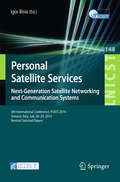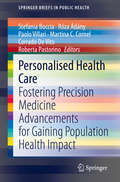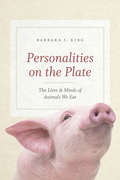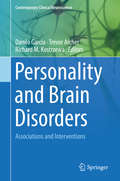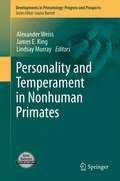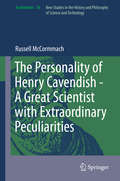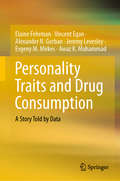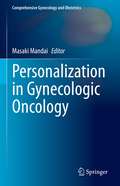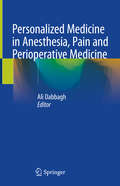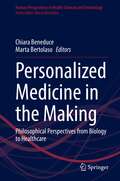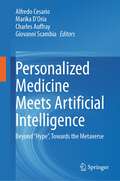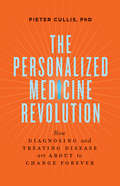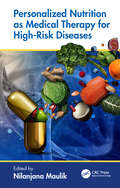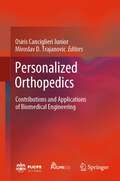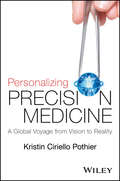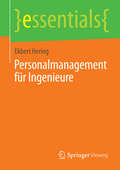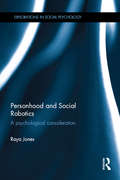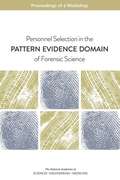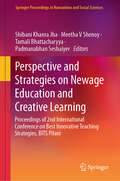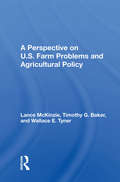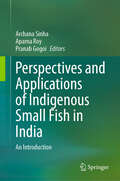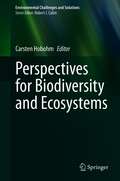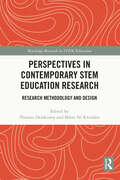- Table View
- List View
Personal Satellite Services. Next-Generation Satellite Networking and Communication Systems
by Igor BisioThis book constitutes the refereed post-conference proceedings of the 6th International Conference on Personal Satellite Services, PSATS 2014, held in Genova, Italy, in July 2014. The 10 revised full papers presented were carefully reviewed and present the latest advances in the next generation satellite networking and communication systems.
Personal Security: A Guide for International Travelers
by Tanya SpencerMaintain peace of mind while you are working or living abroad wherever and however you travel. As an international traveler, you know there are risks. But are you doing everything you can to protect yourself and your belongings? Whether you are traveling for work or pleasure, Personal Security: A Guide for International Travelers enables you to pre
Personalised Health Care: Fostering Precision Medicine Advancements for Gaining Population Health Impact (SpringerBriefs in Public Health)
by Stefania Boccia Róza Ádány Paolo Villari Martina C. Cornel Corrado De Vito Roberta PastorinoPractitioners are increasingly adopting a personalised medicine approach to individually tailored patient care, especially disease diagnosis and treatment with the use of biomarkers. However, development and implementation of such approaches to chronic disease prevention need further investigation and concerted efforts for proper use in healthcare systems. This book provides high-quality, multidisciplinary knowledge from research in personalised medicine, specifically personalised prevention of chronic disease. It addresses different perspectives of prevention in the field, and is the outcome of a four-year work of the Personalized prevention of Chronic Disease (PRECeDI) Consortium, a multi-disciplinary and multi-professional team of experts. The Consortium jointly agreed to document and address the five aspects or domains of personalised medicine and prevention as individual chapters: Identification of biomarkers for the prevention of chronic diseaseEvaluation of predictive genomic applicationsEthico-legal and policy issues surrounding personalised medicineRoles and responsibilities of stakeholders in informing healthy individuals on their genome: a sociotechnical analysisIdentification of organisational models for the provision of predictive genomic applicationsThe book focuses on the Consortium's recommendations that are derived from each of these domains based on up-to-date evidence and research that the authors write, follow, and systematically organise and report.Personalisation of health care is, eventually, a driver of innovation in research and healthcare systems. With this SpringerBrief on Personalised Health Care: Fostering Precision Medicine Advancements for Gaining Population Health Impact, the Consortium provides further evidence of the clinical validity and utility of personalised medicine with special emphasis on the prevention of chronic diseases. The book is a useful resource for policy makers, industry and healthcare professionals, scientists, technology-sector professionals, investors, citizens, and private companies that need proper advice to realise the potential of personalised medicine.
Personalities on the Plate: The Lives & Minds of Animals We Eat
by Barbara J. KingIn recent years, scientific advances in our understanding of animal minds have led to major changes in how we think about, and treat, animals in zoos and aquariums. The general public, it seems, is slowly coming to understand that animals like apes, elephants, and dolphins have not just brains, but complicated inner and social lives, and that we need to act accordingly. Yet that realization hasn’t yet made its presence felt to any great degree in our most intimate relationship with animals: at the dinner table. Sure, there are vegetarians and vegans all over, but at the same time, meat consumption is up, and meat remains a central part of the culinary and dining experience for the majority of people in the developed world. With Personalities on the Plate, Barbara King asks us to think hard about our meat eating--and how we might reduce it. But this isn’t a polemic intended to convert readers to veganism. What she is interested in is why we’ve not drawn food animals into our concern and just what we do know about the minds and lives of chickens, cows, octopuses, fish, and more. Rooted in the latest science, and built on a mix of firsthand experience (including entomophagy, which, yes, is what you think it is) and close engagement with the work of scientists, farmers, vets, and chefs, Personalities on the Plate is an unforgettable journey through the world of animals we eat. Knowing what we know--and what we may yet learn--what is the proper ethical stance toward eating meat? What are the consequences for the planet? How can we life an ethically and ecologically sound life through our food choices? We could have no better guide to these fascinatingly thorny questions than King, whose deep empathy embraces human and animal alike. Readers will be moved, provoked, and changed by this powerful book.
Personality and Brain Disorders: Associations and Interventions (Contemporary Clinical Neuroscience)
by Richard M. Kostrzewa Trevor Archer Danilo GarciaBrain disorders (neurodevelopmental, neurodegenerative, and affective disorders) can be investigated, treated, and prevented using person-centered methods. Because researchers have not reached a clear consensus on whether or not personality is stable or changeable, it has been difficult to outline how to use these methods in the care of people with brain disorders. Thus, the first part aims to identify the ways in which brain disorders and personality are linked. The second part explores different person-centered approaches that can be incorporated in a healthcare or education setting to help people with various brain disorders and to promote physical, mental and social health. The third part focuses on challenges and new venues.
Personality and Temperament in Nonhuman Primates
by Alexander Weiss James E. King Lindsay MurrayRecently, there has been an increased interest in research on personality, temperament, and behavioral syndromes (henceforth to be referred to as personality) in nonhuman primates and other animals. This follows, in part, from a general interest in the subject matter and the realization that individual differences, once consigned to 'error' terms in statistical analyses, are potentially important predictors, moderators, and mediators of a wide variety of outcomes ranging from the results of experiments to health to enrichment programs. Unfortunately, while there is a burgeoning interest in the subject matter, findings have been reported in a diverse number of journals and most of the methodological and statistical approaches were developed in research on human personality. The proposed volume seeks to gather submissions from a variety of specialists in research on individual differences in primate temperament, personality, or behavioral syndromes. We anticipate that chapters will cover several areas. The first part of this edited volume will focus on methodological considerations including the advantages and disadvantages of different means of assessing these constructs in primates and introduce some statistical approaches that have typically been the domain of human personality research. Another part of this edited volume will focus on present findings including the physiological and genetic bases of personality dimensions in primates; the relationship between personality and age; how personality may moderate or impact various outcomes including behavior, health, and well-being in captive and non-captive environments. For the third part of the volume we hope to obtain summaries of the existing work of the authors on the evolutionary important of personality dimensions and guideposts for future directions in this new and exciting area of research.
The Personality of Henry Cavendish - A Great Scientist with Extraordinary Peculiarities
by Russell MccormmachProfiles the eminent 18th century natural philosopher Henry Cavendish, best known for his work in chemistry and physics and one of the most baffling personalities in the history of science. In these chapters we are introduced to the psychology of science and of scientists and we learn about Cavendish's life and times. His personality is examined from two perspectives: one is that he had a less severe form of autism, as has been claimed; the other is that he was eccentric and a psychological disorder was absent. Henry Cavendish lived a life of science, possibly more completely than any other figure in the history of science: a wealthy aristocrat, he became a dedicated scientist. This study brings new information and a new perspective to our understanding of the man. The scientific and non-scientific sides of his life are brought closer together, as the author traces topics including his appearance, speech, wealth, religion and death as well as Cavendish's life of natural philosophy where objectivity and accuracy, writing and recognition all played a part. The author traces aspects of Cavendish's personality, views and interpretations of him, and explores notions of eccentricity and autism before detailing relevant aspects of the travels made by our subject. The author considers the question "How do we talk about Cavendish?" and provides a useful summary of Cavendish's travels. This book will appeal to a wide audience, from those interested in 18th century history or history of science, to those interested in incidences of autism in prominent figures from history. This volume contains ample relevant illustrations, several interesting appendices and it includes a useful index and bibliography.
Personality Traits and Drug Consumption: A Story Told by Data (SpringerBriefs in Statistics)
by Elaine Fehrman Vincent Egan Alexander N. Gorban Jeremy Levesley Evgeny M. Mirkes Awaz K. MuhammadThis book discusses the psychological traits associated with drug consumption through the statistical analysis of a new database with information on 1885 respondents and use of 18 drugs. After reviewing published works on the psychological profiles of drug users and describing the data mining and machine learning methods used, it demonstrates that the personality traits (five factor model, impulsivity, and sensation seeking) together with simple demographic data make it possible to predict the risk of consumption of individual drugs with a sensitivity and specificity above 70% for most drugs. It also analyzes the correlations of use of different substances and describes the groups of drugs with correlated use, identifying significant differences in personality profiles for users of different drugs. The book is intended for advanced undergraduates and first-year PhD students, as well as researchers and practitioners. Although no previous knowledge of machine learning, advanced data mining concepts or modern psychology of personality is assumed, familiarity with basic statistics and some experience in the use of probabilities would be helpful. For a more detailed introduction to statistical methods, the book provides recommendations for undergraduate textbooks.
Personalization in Gynecologic Oncology (Comprehensive Gynecology and Obstetrics)
by Masaki MandaiThis book thoroughly illustrates the designed and tailored medical approaches for tumors of the female reproductive organ. The chapters explore different cancer species such as ovarian cancer, endometrial cancer, cervical cancer, etc. Various treatment modalities such as immunotherapy and histotype-specific treatment are delivered, and it offers a chapter on how genome-wide analysis contributes to personalized treatment. It is essential to understand this concept because many molecular target drugs and the prevalence of genome-based analysis in clinical settings have enabled us to introduce valid precision medicine in the field of gynecologic oncology. Chapters explain the stream of transition from conventional standardized treatment to personalized treatment and address future perspectives.Personalization Gynecologic Oncology is a well-designed source for beginning to advanced oncologists, gynecologists, geneticists, genetic counselors, and nurses. Offering the latest treatment strategies, the Editor hopes the ideas presented here will be a foundation for further development in the field.
Personalized Medicine in Anesthesia, Pain and Perioperative Medicine
by Ali DabbaghThis book discusses the current and future impact of cellular and molecular medicine (CMM) on anesthesiology and perioperative medicine. It covers the topic from a translational perspective and describes the relevance of CMM to daily clinical practice. Taking a bench-to-bedside approach, chapters examine topics including perioperative acute and chronic management, perioperative organ protection, and novel pharmaceuticals. Personalized Medicine in Anesthesia, Pain and Perioperative Medicine is aimed at anesthesiologists and pain physicians, and will also be of interest to pharmacists and those working in cellular and molecular medicine.
Personalized Medicine in the Making: Philosophical Perspectives from Biology to Healthcare (Human Perspectives in Health Sciences and Technology #3)
by Marta Bertolaso Chiara BeneduceThis book offers a multidisciplinary look at the much-debated concept of “personalized medicine”. By combining a humanistic and a scientific approach, the book builds up a multidimensional way to understand the limits and potentialities of a personalized approach in medicine and healthcare. The book reflects on personalized medicine and complex diseases, the relationship between personalized medicine and the new bio-technologies, personalized medicine and personalized nutrition, and on some ethical, political, economic, and social implications of personalized medicine. This volume is of interest to researchers from several disciplines including philosophy, bio-medicine, and the social sciences.
Personalized Medicine Meets Artificial Intelligence: Beyond “Hype”, Towards the Metaverse
by Alfredo Cesario Marika D’Oria Charles Auffray Giovanni ScambiaThe book provides a multidisciplinary outlook on using Artificial Intelligence (AI)-based solutions in the field of Personalized Medicine and its transitioning towards Personalized Digital Medicine.The first section integrates different perspectives on AI-based solutions and highlights their potential in biomedical research and patient care. In the second section, the authors present several real-world examples that demonstrate the successful use of AI technologies in various contexts. These include examples from digital therapeutics, in silico clinical trials, and network pharmacology. In the final section of the book, the authors explore future directions in AI-enhanced biomedical technologies and discuss emerging technologies such as blockchain, quantum computing and the “metaverse”. The book includes discussions on the ethical, regulatory, and social implications for an AI-based personalized medicine. The integration of heterogeneous disciplines brings together multiple stakeholders and decision makers involved in the personalization of care. Clinicians, students, and researchers from academia and the industry can benefit from this book, since it provides foundational knowledge to drive advances in personalized biomedical research and health care.
The Personalized Medicine Revolution
by Pieter CullisEvery one of us is unique. With recent advances in technology, we now know that that statement is more true that ever: we are each individuals, right down to a molecular level - a one-of-a-kind combination of genes, proteins, and metabolism. So why does healthcare still take a one-size-fits-all approach? The same methods are used on everyone to diagnose illness, and the same drugs are used to treat it - despite the fact that those methods and treatments are not effective for everyone and are even harmful for some. Shouldn't our medicine be tailored to our differences? The Personalized Medicine Revolution explores recent advances in genomics, the study of the human genome - as well as its cousins proteomics, metabolomics, microbiomics, and the like - and explains how technology is even now changing the way medicine is delivered. Along the way, it takes the reader through the five critical healthcare areas that will be transformed most radically by personalized medicine - prediction, prevention, diagnosis, treatment, and monitoring - and examines the practical and ethical issues involved. Finally, it details how readers can use personalized medicine to take charge of their own health and build a stronger and safer medical system.
Personalized Nutrition as Medical Therapy for High-Risk Diseases
by Nilanjana MaulikPersonalized nutrition involves the formulation of individualized nutritional recommendations to promote and maintain health based on an individual's genetic makeup and other unique intrinsic and extrinsic factors. Implementing personalized nutrition plans for individuals with certain diseases or who are in danger of developing health conditions could help control the onset and severity of symptoms. Personalized Nutrition as Medical Therapy for High-Risk Diseases offers a practical guide for physicians seeking to provide tailored dietary recommendations to their patients with disease treatment, modulation and prevention in mind. The book focuses on the biological mechanisms of specific diseases and provides evidence for how personalized nutrition positively impacts them. It explores conditions including cardiovascular diseases, hypertension, hypercholesteromia, diabetes, obesity, Crohn's disease, as well as multiple pediatric, renal and psychological disorders. Features: · Includes case studies that document how people respond differently towards food depending on their genetic structure and other factors. · Discusses genome wide association studies (GWIMS) to understand the interplay between genetic susceptibility and dietary interactions. · Provides users information to effectively implement personalized nutrition into practice. · Identifies possible challenges to the implementation of personalized nutritional interventions in a clinical setting. This book is for medical practitioners and will also appeal to researchers and students.
Personalized Orthopedics: Contributions and Applications of Biomedical Engineering
by Osiris Canciglieri Junior Miroslav D. TrajanovicThis book covers the most important topics in the field of personalized orthopedics. It starts with the 3D geometry of the bones, focusing on the problem of reverse engineering of the bones. It also shows the application of a 3D geometric model of bone for the design of personalized implants and prostheses. This book covers the application of additive technologies in personalized orthopedics as well as prediction, simulation and optimization in personalized orthopedics. Its content provides the necessary knowledge for the transition from classical to personalized orthopedics. The authors present an original method for reverse bone engineering—the Method of Anatomical Features (MAF). This method is unique as it enables the reconstruction of the original geometry and topology of the bone, even when only data on its part are available. The application of this method is shown on the examples of human long bones, mandible and hip bone reconstruction. This book contains a review of several real cases of personalized implants. It gives several examples of prostheses for the design of which a 3D model of bones was used, as well as other patient data on the basis of which personalized prostheses were designed.
Personalizing Precision Medicine: A Global Voyage from Vision to Reality
by Kristin Ciriello PothierThe author uses decades of experience and interviews with experts in precision medicine to explain past, present, and future of precision medicine. She reviews the full continuum of personalizing precision medicine, including diagnostics, therapeutics, big data, supportive care, regulation, and reimbursement and innovation in precision medicine worldwide.• Combines a unique cross section of history, current technologies, and future directions for how precision medicine has and will affect people worldwide• Reviews precision medicine around the world, including the US, China, Japan, the Middle East, India, Europe, and Latin America• Discusses a number of diseases areas – cancer, cardiovascular, neurodegenerative, infectious disease, pain, immunology, rare diseases• Includes information and quotes from over 100 interviews with key industry experts in biotech, pharma, informatics, diagnostics, health providers, advocacy groups, and more.• Includes stories illustrating current issues and future promises in precision medicine for a human touch
Personalmanagement für Ingenieure (essentials)
by Ekbert HeringMitarbeiter sind die wichtigste Ressource eines Unternehmens. Geeignetes Personal zu finden und an das Unternehmen zu binden, gehört daher zu den wichtigsten und erfolgsentscheidenden Aufgaben im Unternehmen. Gerade Ingenieure übernehmen im Laufe ihrer Karriere immer mehr Personalverantwortung. Deshalb sind die Kenntnisse über Personalmanagement für Ingenieure sehr wichtig. Im Mittelpunkt steht dabei die Persönlichkeit eines Menschen. Anhand des Verhaltensmodells nach persolog® werden verschiedene Persönlichkeitsprofile aufgezeigt sowie deren Stärken und Schwächen vorgestellt (beispielsweise für Konstrukteure oder Innovatoren). Wichtig ist dabei, dass die Mitarbeiter entsprechend ihren Stärken richtig eingesetzt werden. Ausführlich werden die Methoden der Personalfindung, der Personalbindung, der Mitarbeiterbeurteilung und Entlohnung sowie der Personaltrennung behandelt.
Personhood and Social Robotics: A psychological consideration (Explorations in Social Psychology)
by Raya A JonesAn exponentially growing industry, human robot interaction (HRI) research has drawn predominantly upon psychologists’ descriptions of mechanisms of face-to-face dyadic interactions. This book considers how social robotics is beginning unwittingly to confront an impasse that has been a perennial dilemma for psychology, associated with the historical ‘science vs. art’ debate. Raya Jones examines these paradigmatic tensions, and, in tandem, considers ways in which the technology-centred discourse both reflects and impacts upon understanding our relational nature. Chapters in the book explore not only how the technology-centred discourse constructs machines as us, but also how humans feature in this discourse. Focusing on how the social interaction is conceptualised when the human-robot interaction is discussed, this book addresses issues such as the long-term impact on persons and society, authenticity of relationships, and challenges to notions of personhood. By leaving aside terminological issues, Jones attempts to transcend ritual of pitching theories against each other in order to comprehensively analyse terms such as subjectivity, self and personhood and their fluid interplay in the world that we inhabit. Personhood and Social Robotics will be a key text for postgraduate students, researchers and scholars interested in the connection between technology and human psychology, including psychologists, science and technology studies scholars, media studies scholars and humanists. The book will also be of interest to roboticists and HRI researchers, as well as those studying or working in areas of artificial intelligence and interactive technologies more generally.
Persönlichkeit braucht Tugenden
by Gerhard Danzer Josef RattnerSpielen im 21. Jahrhundert Tugenden eigentlich noch eine Rolle? Der Autor beschreibt in seinem Buch neun Charakterzüge und Wesensmerkmale, die für die Entwicklung eines Menschen seiner Meinung nach von Bedeutung sind. Dazu gehören beispielsweise Besonnenheit, Hingabe, Humor, aber auch Vornehmheit. Ein Buch, mit dem der Autor auf unterhaltsame Art und Weise zum Nachdenken über die eigenen Tugenden anregt.
Personnel Selection in the Pattern Evidence Domain of Forensic Science: Proceedings of a Workshop
by National Academies of Sciences Engineering MedicineIn July 2016 The National Academies of Sciences, Engineering, and Medicine convened a workshop with the goal of bringing together industrial and organizational (I-O) psychologists, experts on personnel selection and testing, forensic scientists, and other researchers whose work has a nexus with workforce needs in the forensic science field with a focus on pattern evidence. Participants reviewed the current status of selection and training of forensic scientists who specialize in pattern evidence and discussed how tools used in I-O psychology to understand elements of a task and measure aptitude and performance could address challenges in the pattern evidence domain of the forensic sciences. This publication summarizes the presentations and discussions from the workshop.
Perspective and Strategies on Newage Education and Creative Learning: Proceedings of 2nd International Conference on Best Innovative Teaching Strategies, BITS Pilani (Springer Proceedings in Humanities and Social Sciences)
by Shibani Khanra Jha Meetha V Shenoy Tamali Bhattacharyya Padmanabhan SeshaiyerThis book presents the proceedings of the International Conference on Best Innovative Teaching Strategies (ICOBITS) at BITS Pilani on Feb 9-11, 2023. It brings together global academicians, researchers, and industry experts to delve into innovative teaching-learning practices. Meticulously selected and reviewed by professionals, the proceedings offer cross-cutting perspectives and strategies in education and creative learning. It is organized into four parts and covers Innovative Pedagogical Practices for Technology Enhanced Learning, Technology, Society and Industry in Higher Education, STEM Education and Cultural Studies, Gender Studies and Sustainability in Higher Education. It provides insights into assessment tools for effectively evaluating the efficiency of teaching methods. Part one explores ICT, digital classrooms, metaverse-based teaching, gamification, and AI-ML-based practices. Part two delves into the humanistic approach in technical education, social networking as an educational tool, and outcome-based assessment needs. Part three addresses future educators' requirements through multidisciplinary collaboration in STEM education. Part four discusses gender equity, structured social inclusion and cultural skills in teaching-learning practices. This book is a valuable resource for academicians, researchers, policymakers, administrators, technocrats, and developers actively engaged in education technology across disciplines such as Engineering, Sciences, Management, Humanities, and Social Sciences.
A Perspective On U.s. Farm Problems And Agricultural Policy
by Lance McKinzieA Perspective on U.S. Farm Problems and Agricultural Policy provides a framework for evaluating national policy alternatives and attempts to improve our understanding of the nature of U.S. farm sector and its problems.
Perspectives and Applications of Indigenous Small Fish in India: An Introduction
by Archana Sinha Aparna Roy Pranab GogoiThis contributed volume covers all aspects of small indigenous fish for nutritional and livelihood security. The availability, descriptions and identification of common small indigenous fish provides potential and prospects of fish production from inland open water system. In addition, individual chapters are added on growth, feeding, diseases and health management of these small fishes. Essential information is provided on packaging and transport of these fishes. Specific chapters provide information on nutritional value of fishes, value addition and product development by using small indigenous fish species in different regions of the country. Further topics include small fishes of ornamental value, indigenous technical knowledge, climate change impact, conservation and management of small indigenous fish diversity. This book supports the academicians, farmers, entrepreneurs and fisheries professionals involved in gaining the knowledge and skills needed to contribute in nutritional and livelihood security of the nation.
Perspectives for Biodiversity and Ecosystems (Environmental Challenges and Solutions)
by Carsten HobohmThe novelty of the book is a strong focus on perception, perspectives and prediction by scientists with profound insight into the ecology of ecosystems or into human demands and activity. The challenge is to bridge from empirical data and the knowledge of the past to the possibilities of the performance in the future. We assume that there is scope for more cooperation between the fields of ecology and practical philosophy or other social sciences in organising ecosystems and shaping the cultural future of humankind, and that such collaboration should be accorded considerably more priority. This book deals with environmental processes seen within a framework of the nature of ecosystems and human cultures. The future of the environment, the development of ecosystems and effective nature conservation management are the essentials of this book. Human nature and culture, and in particular their interactions, are interpreted as a set of rules and as given. The aim is not only to assess the significance of human influence on species composition and biodiversity but also to weigh up the subsequent potentials for action. In this book we will analyze the problems independently of one another, even if they are interconnected. This book focuses on perspectives and prognoses for the impacts of anthropogenic activity on ecosystems and thus on species conservation. Its goal is to improve assessments of the impacts of human activity on the environment. We are aware that prognoses have very often proven to be false. It is difficult to impossible to be able to predict with precision how evolution and ecosystems will change in future under anthropogenic influence. This strengthens our resolve to attempt to retain the highest possible degree of scientific integrity and professionalism and not to shy away from expressing the uncertainty of our own ideas and prognoses. We venture prognoses in this book and we will fail. However, we hope that we will be wrong on the right side.
Perspectives in Contemporary STEM Education Research: Research Methodology and Design (Routledge Research in STEM Education)
by Thomas Delahunty Máire Ní RíordáinThis book presents an overview of the methodological innovations and developments present in the field of STEM education research as well as providing a practically orientated resource on research method design more broadly. Featuring a range of international contributors in the field, the book provides a compendium of exemplary innovative methodological designs, implementations, and analyses that answer a variety of research questions relating to STEM education disciplines. Charting the thinking behind the design and implementation of successful research investigations, the book’s two parts present an accessible and pragmatically framed set of chapters that cover a range of important methodological areas presented by active researchers in the field. Ultimately, this book presents a comprehensive resource that explores the act of educational research as related to STEM. By showcasing key methodological principles with guidance on practical approaches underpinned by theory, the book offers scholarly research-informed suggestions for practice. It will be of great interest to researchers, academics, and students in the fields of STEM education and education research methods, as well as educational research more broadly.
